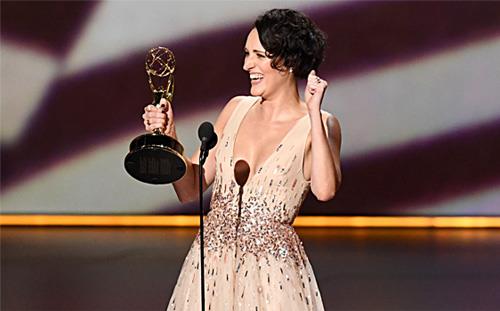
In the end, after three hours of an Emmy night long on moments and even longer on memories, Game of Thrones and Fleabag emerged as winners of the 71st Primetime Emmy Awards for outstanding drama and comedy series respectively.
It was a very good night for HBO, which ran the table overall with a cumulative 12 Emmys for Thrones and a further 10 for Chernobyl, which also picked up the coveted award for limited series over a competitive field that included FX’s Fosse/Verdon and Netflix's When They See Us.
Look past the big prizes, though, and there was a distinct changing of the guard. English playwright, producer, and writer Phoebe Waller-Bridge (top), a virtual unknown just five years ago, picked up three Emmys, for best actress in a comedy and, more tellingly, for writing and for producing. Fleabag, Waller-Bridge’s personalized comedy about a perpetually annoyed and confused young woman living in London, was co-produced by BBC and Amazon Studios. Coupled with a pair of awards, in the supporting actor categories for last year’s comedy favorite The Marvelous Mrs. Maisel, for Alex Borstein and Tony Shalhoub, upstart streaming service Amazon Prime proved it’s now on a near equal footing with streaming rival Netflix.
Waller-Bridge also scored with her other creation, the high-octane espionage thriller Killing Eve, which earned a best actress win for co-star Jodie Comer over her Killing Eve castmate Sandra Oh, who had been tapped as the frontrunner in a category that included Game of Thrones’ Emilia Clarke and House of Cards’ Robin Wright.
Netflix, for its part, pulled off a couple of shock upsets to go with its near-record haul last week in the documentary series categories for Our Planet. Netflix’s second-year crime drama Ozark scored the biggest talking point of the night in terms of shock results, as actor-director Jason Bateman won the Emmy for best director over a field that included no fewer than three directors of Game of Thrones and directors from The Handmaid’s Tale and Succession. Ozark’s Julia Garner was visibly startled to win the Emmy for supporting actress, over a field that included four actresses from Game of Thrones.
Game of Thrones’ big award for outstanding drama aside, coupled with a repeat supporting actor win for Peter Dinklage, the night’s results only furthered suspicions that Emmy voters have never taken Game of Thrones that seriously in the major acting and writing categories. Not for the first time, the bulk of its field-leading haul of 12 Emmys came from technical categories like set design, cinematography, and sound editing.
Game of Thrones’ legion of fans had invested a lot of emotion and hope heading into Sunday’s awards, as this was Thrones’ farewell season, and there was a feeling that Emilia Clarke, Lena Headey, Gwendoline Christie, and Maisie Williams had put in their finest performances of the entire series’ run, only to have those hopes dashed.
Conspiracy theories from Game of Thrones fans abounded on social media early Monday, including the suggestion that the Thrones’ actresses votes had cancelled each other out.
While Thrones actors other than Dinklage are likely to walk away disappointed, there can be no doubt about Thrones’ place in television history. It not only consolidated HBO’s hold on the industry, it changed the way production studios approach the so-called small screen in general, by mounting a production as expensive and eye-filling as anything seen on the big screen and doing it not as a one-off but over a seven-year period. Taken in that context, Game of Thrones winning outstanding drama series in its farewell season seems apt.
HBO had a big night, as expected, with a best comedy actor win for Bill Hader, from Barry, to go with its haul for Game of Thrones and Chernobyl.
Industry rival Netflix didn’t walk away empty-handed, however.
Netflix’s Black Mirror: Bandersnatch won the award for outstanding TV movie, over a strong field that included Brexit and HBO’s Deadwood: The Movie. The Black Mirror win caps a remarkable run for writer-producer Charlie Brooker, who has now won Emmys in three consecutive seasons.
The evening, as always, had its share of emotional moments, including a heartfelt tribute by Saturday Night Live guru Lorne Michaels to the late cast member Chris Farley, and a rousing speech by limited-series actress Michelle Williams, who won the Emmy for her bravura performance as classical dancer Gwen Verdon in Fosse/Verdon. Williams carried the torch for equal treatment — and equal pay — for women, telling the audience that she saw her Emmy for Fosse/Verdon as acknowledgment of what’s possible when a woman is encouraged to trust her own ideas, feels safe enough to voice them, and is respected enough to know they’ll be heard.
“The next time a woman, and especially a woman of color — because she stands to make 52 cents on the dollar compared to her white male counterpart — tells you what she needs in order to do her job, listen to her, believe her.”
In other awards:
Saturday Night Live and Last Week Tonight with John Oliver landed Emmys for outstanding variety sketch series and variety talk series respectively.
Repeat winner John Oliver is fast becoming the new Jon Stewart, in terms of Emmy wins; Stewart’s Daily Show was a perennial winner in its time, and Last Week Tonight is following in a similar vein.
It’s that other win, though, Saturday Night Live, that points up the growing trend in prestige TV. It was a terrible night for the broadcast networks, once again, with Saturday Night Live — now in its 45th season — the sole representative of the Big Four broadcast networks among the night’s Emmy winners.
It’s worth noting that, just 20 years ago, David E. Kelley made Emmy history by winning the Emmy for outstanding comedy, Ally McBeal, and outstanding drama, The Practice, in the same year. Ally McBeal aired on Fox; The Practice aired on ABC.
How times have changed.
Today, Kelley is writing and producing Big Little Lies— for HBO.